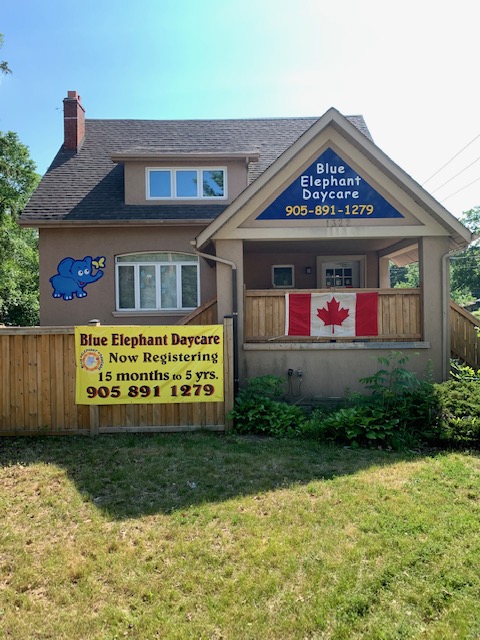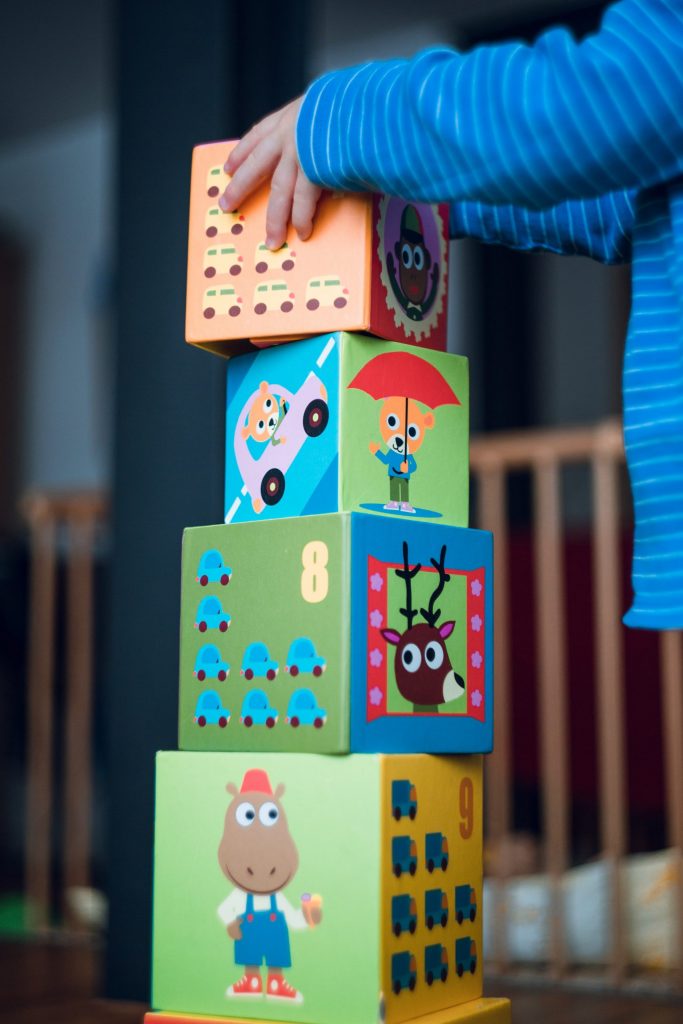Welcome
Thank you for your interest in Blue Elephant Daycare. We have successfully been operating a high quality program for children aged eighteen months to five years. We are licensed by the Ministry of Education and governed by the Child Care and Early Years Act. Our license capacity is 44 children where we have 24 children who are pre-schoolers (31 months to 5 years) and 20 children toddlers (18 months to 30 months).
We accept children between 15 to 18 months as part of our license (20% mixed age group) and can have 4 children in this age group in two of our toddler rooms as long as they are walking.
We have one Pre-School Room of 24 children and the ratio is 1 teacher to 8 children. We have two toddler rooms of 10 children each. The ratio is 1 teacher to 5 children.
We have a service agreement with the Region of Peel and accept children on subsidy.
We are conveniently located at 1322 Hurontario Street, Mississauga, ON. Steps to the Port Credit Go Station, just South of the QEW and are easily accessible by Mississauga Transit.

Blue Elephant Daycare participates in Raising the Bar in Peel, an ongoing quality initiative for child care and early years programs in Peel. It engages child care and early years professionals in ongoing reflection and critical thinking to enhance quality in programs. This initiative fosters relationship-building and is based upon the following foundations:
Lifelong Learning Reflective Educators
Mentorship Leadership Collaborative Inquiry
Our staff are committed to providing a high quality, caring and professional environment for your child. This e-mail address is being protected from spambots. You need JavaScript enabled to view it
We offer a full day program (5 days a week, 4 days a week, 3 days a week and 2 days a week if space is available) that provides children with enjoyment, rewarding experience and a feeling of self-worth and independence. Children are given freedom to make choices while learning to accept the limits and respect each other. Children work and play together in an inclusive atmosphere that promotes co-operation, celebrating differences and accepting similarities and diversity. Parents can be rest assured that their child is left in a safe and happy environment where all children belong.
Our program is designed to instill the grass roots of learning: Language (Reading and Writing), Math, Music, Art through our purposeful and intentional Play Based Learning curriculum. We provide high-quality care and education that is built on a foundation of co-operation and trust that leads to mutually rewarding relationships involving children, parents and teachers. When such relationships are developed, children are likely to be well adjusted and have a strong sense of their own value and self-worth.
Some key features:
- Staff include professionals with certificates in Early Childhood Education, (ECE) who are registered at the College of Early Childhood Education and in good standing
- Staff are dedicated, warm and caring
- Professionals follow the child’s lead and interest in intentional Play based learning curriculum
- Toddler, Preschooler and Kindergarten enrichment program – Play Based Learning philosophy
- We offer a safe, learning environment that is inclusive and children have a sense that they all belong.
- Licensed since 1989
- Children are treated in a positive manner that enhances self-esteem and confidence
- Teachers work with small groups for most of the day thus promoting one on one attention and interaction
- Memberships with Raising the Bar, CDRCP (Child Development Resource Connection Peel), High Scope
- Cook on site cooking nutritious meals following Canada Food Guidelines
- Spacious rubber surfacing playground with lots of shade.

We have also developed a parent handbook about the daycare and the various policies and procedures that have been developed to ensure the safety and well-being of your child. The parent handbook is available on our website too under Parent resources. If you are interested in admitting your child to this program and would like further information, please feel free to call us for a meeting/tour that can be arranged.
We will answer any questions you may have by phone or email. Once you have decided that you are accepting the placement after it is offered to you, you can complete the application form on our parent information booklet under Parent resources and consent forms and send it electronically back to us . You can also drop it off at our mail box by the main entrance door in a sealed envelope or in person. All information remains confidential. Under the Personal Information Protection and Electronic Documents Act, the personal information collected in the application form is solely used for gaining more information on the child when in the care of the Daycare. It is important in emergencies purposes for staff to contact parents. No personal information is disclosed without the consent of the parent.
If you have any questions relating to information or general questions, please contact the Supervisor at 905 891 1279 or email us at info@blueelephantdaycare.com.
Blue Elephant Daycare is committed to delivering an inclusive child care program that promotes high quality care and positive and healthy environments where children, families and educators are co-learners.
Our program statement:
The program statement for Blue Elephant Daycare is built on the pedagogical framework presented in How Does Learning Happen? Ontario’s Pedagogy for the Early Years. It builds on the four foundations, expectations and goals of learning as follows:
| Foundations | Goals for children | Expectations for programs |
| Belonging | Every child has a sense of belonging when he/she is connected to others and contributes to his/her world | Cultivate respectful relationships and connections to create a sense of belonging among and between children/adults and the world around them. |
| Well-Being | Every child is developing a sense of self and health and well-being | Nurture children’s healthy development and support their growing sense of self. |
| Engagement | Every child is an active and engaged learner who explores the world with his/her senses, bodies and mind | Provide environments and experiences to engage children in active, creative and meaningful exploration and learning |
| Expression | Every child is a capable communicator who is able to express himself/herself in many ways. | Foster communication and expression in all form |
How Does Learning Happen builds on a shared understanding between children, families and educators as follows:
| Children are | Capable of complex thinking, curious, competent, contributes to their world, deserve an opportunity to succeed, should feel that they belong |
| Families are | Competent, curious, capable, rich in experience, the experts on their children, first and most powerful influence on children and deserve to be engaged in a meaningful way. |
| Educators are | Capable, competent, curious, knowledgeable, caring, reflective professionals, life long learners who collaborate |

To this end:
We promote the health, safety, nutrition and well-being of every child
- By observing children and communicating with staff throughout the day to check for signs of illness and report it to Supervisor who in turn communicates with the parent. Children or staff who become ill while attending the daycare must return home as soon as possible. The Supervisor initiates the Centre’s Illness Management Policy
- Educators follow the health and safety guidelines set out by Ministry of Education , Ontario Public Health and Peel Public Health
- Staff and children wash their hands throughout the day following hand washing policy.
- Educators sit with the children and encourage children to try new foods.
- Well organized materials easily available to children and cleaned and disinfected frequently.
- Educators follow child’s interest and provide materials and activities that enhance all round development. Most materials used are easily washable and sanitized regularly.
- Throughout the day every Educator ensures that the environment is safe for children and families
- We promote nutrition by ensuring the meals follow Canada Food Guidelines and being mindful and inclusive of children’s individual meal requirements (i.e. allergies, food restrictions, etc.)
We support positive and responsive interactions among children, parents, child care providers and staff
- Providing a warm environment for children, families and all staff to feel comfortable to share ideas, communicate any concerns and be sensitive to the needs of others. We connect with parents strengthening the relationships by phone or email or in person. We give attention to those who need it by encouraging the child through communication and positive guidance. Children choose their own activities from their own area/space and we respond to their needs in a positive way. Children and families can express themselves and we listen. We provide positive feedback and work together to provide the best care for children.
- Team meetings and staff meetings occur either on a bi-weekly or monthly basis and we share information and discuss possibilities to provide children with deeper explorations. We invite others perspectives in planning (children, parents, teachers etc.) to work towards the child’s goal. Develop an environment where children feel safe and comfortable to share their thoughts and ideas.
- Provide families with information on their children’s daily routines, maintaining open communication to create an inclusive program between families and child care providers and done through email, virtual meetings, phone calls or in person meetings.
We encourage the children to interact and communicate in a positive way and support their ability to self-regulate
- Positive interactions between children, parents and staff using phone calls, emails, one on one meeting etc.
- For new parents, arranging tours and telephone consultation sharing information about the program and scheduling visits that are convenient for parents and Supervisor
- Observing children, providing support when needed, guide them by talking to them in their interactions and play.
- Promoting problem solving where staff observe and watch and provide positive guidance and self-independence
- We provide children with opportunities to self-regulate by encouraging them to eat independently when possible, dress and undress themselves. At rest time, they choose to sleep or have a quiet rest. Once they can self-regulate their bodies, they can choose to go when they need to the washroom.
- Educators are sensitive to child’s needs and acknowledge their emotions – eg: I see, It looks like..
- They are being encouraged to self-regulate their emotions by communicating with the peers and letting their peers know how they feel and resolve conflicts in a respectful way.
We foster the children’s exploration, play and inquiry
- Provide opportunities and encouragement for children to express themselves through positive guidance
- Preparing an environment to foster their learning and development that reflect their interest and explore their environment
- Having them choose their activity and observing them in play and extending the learning with open ended questions, building on the children’s questions, ideas and theories observed in play.
- Provide a variety of open-ended and loose part materials in the classroom some of which can be cleaned and disinfected easily which have multiple uses and stimulate different kinds of play; encourage children to brainstorm and explore ways in which the material can be used
We provide child-initiated and adult supported experience
- Provide children with age and developmentally appropriate activities that allow for language, cognitive, social-emotional, physical and creative development. A variety of activity bins for each child to explore and create. Group play to initiate conversations and observe creativity
- Observing them at play and accordingly plan and provide materials for children to engage and choose their play. We support them by building on children’s questions, ideas and theories observed in play. Children make their own decisions in their choice of play. Provide children opportunities to lead their play independently
- Allow children opportunities to play independently and adult to support that experience and observe.
We plan for and create positive learning environments and experiences in which each child’s learning and development will be supported
- There are times when the children take the lead in planning activities and Educator observes and builds on child’s interest and expand and support child’s learning (co-learning)
- Promote appropriate modes of communication amongst children through role modeling and encouragement to use positive language/body language (i.e. speaking calmly about how we feel/what we can do when we feel the way we do)
- Observing children and planning and implementing based on their interests and support their learning and development – Use Every Learning for Every Child Today (ELECT) document for capturing the development for each child as well as the Nippissing Screening Tool. Also using an environmental assessment tool to exceed goals.
- Focus on children’s interests, providing material allowing them to extend their learning on these interests.
We incorporate indoor and outdoor play as well as active play, rest and quiet time, into the day and give consideration to the individual needs of the children receiving child care
- Individual or small group play and individual or small group activities provided that have creative materials for indoor and outdoor play
- Spreading children in different areas incorporating more individual play or small group activities respecting space
- Offering opportunities for small group activities indoors and outdoors
- Provide children opportunities to share their own experiences, ideas and understandings with their peers and Educators and understanding and responding to child’s individual needs
- Offering quiet activities for individual play at quiet times and/or rest time
Foster the engagement of and ongoing communication with parents about the program and their children
- Having a close professional partnership with families based on trust so we can meet the needs of their child.
- Daily communication (phone call and email) during drop off and pick up by parent/guardian to discuss child’s health or highlights of the child’s day
- Planned opportunities to communicate with parents by scheduling one on one meetings
Involve local community partners and allow those partners to support the children, their families and staff
- PIRS (Peel Inclusion Resources Services) and involving our PIRS consultant for support
- Sharing information through emails to parents on workshops or materials of interest to parents such as : to Unlock food Ontario menu planning, Region of Peel and Child Development Resource Connection Peel parenting workshops information,
- Memberships with Raising the Bar in Peel, a Quality Initiatives program where staff network online with other programs and share information
- Getting support from our Early Years Specialist in the Region of Peel
- Getting advice and support from our Program Advisor, Ministry of Education.
Support continuous professional learning
- Providing opportunities and support for staff to attend workshops and training on line in the Child Care field and keep updated on the changes and knowledge in early childhood education and development.
Webinars offered through Child Development Resource Connection Peel (CDRCP) or through College of Early Childhood Educators and other online professional workshops.
Document and review the impact of the strategies (all noted above) on the children and their families
Child’s observations are being documented on the Continuum of Development document (ELECT) as well as Nipissing District Developmental Screen to help them reach their milestones and development and have goals set for each child.
Teachers then review documents in order to support the child’s expression in all forms. They reflect on the activities presented and how it went and how to extend the learning further or what could they have done to get a better response.
Engaging families by sharing their child’s play with them by email. Posting activities on Facebook and Instagram. Communicating on email or phone to parents
Resources: How Does Learning Happen (HDLH) Think, Feel, Act
Child Care and Early Years Act (CCEYA)
By-law 21: Code of Ethics and Standards of Practice and the Professional Misconduct Regulation under the Early Childhood Educators Act, 2007
